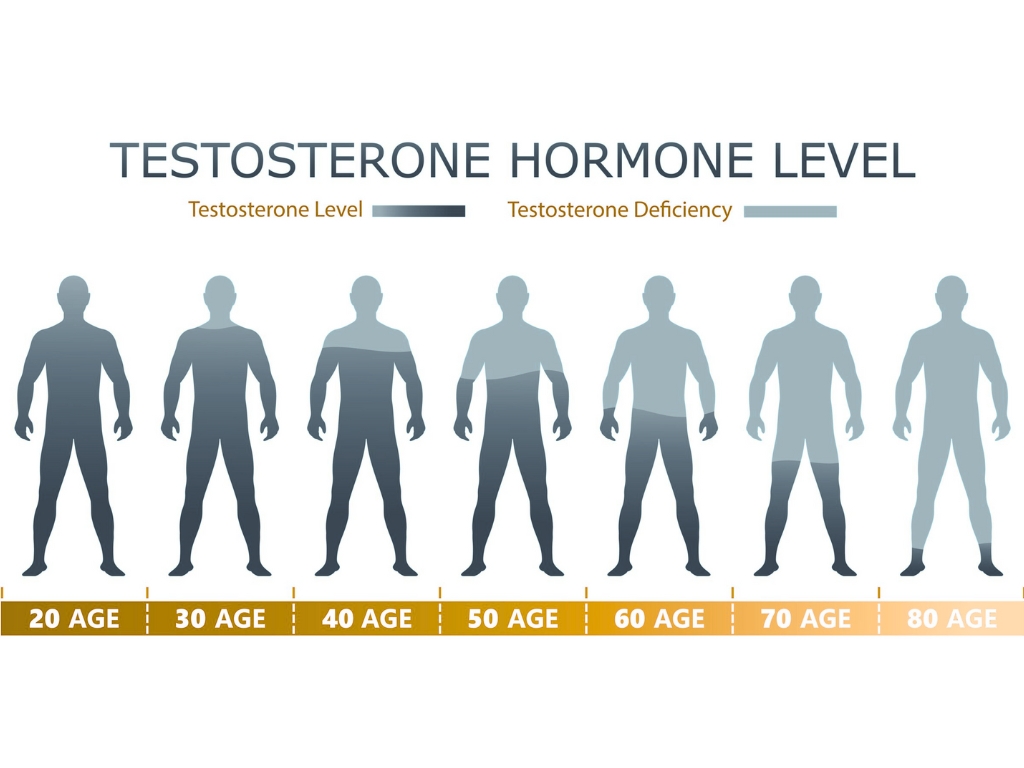Testosterone is often thought of as the hormone of strength, masculinity, and drive. While it is true that testosterone is vital for building muscle, maintaining sexual health, and fuelling motivation, its role extends far beyond the stereotypical.
Testosterone supports bone health, mood stability, fat distribution, red blood cell production, and even cognitive sharpness [1-5]. Despite this, levels of testosterone in men start to fall gradually from around the age of thirty. The average drop is about 1% per year [6], but for some, this change is far from subtle.
The decline in testosterone has been studied extensively, and the statistics are striking. Globally, around 10-40% of men are believed to have clinically low testosterone, depending on age group and defined ranges [7].
In fact, the European Male Ageing Study, often cited in research, found that approximately 5% of men aged between forty and seventy live with hypogonadism – the medical term for testosterone deficiency [8]. Though that is only the case if you are living with no comorbidities, it is a different outlook for others.
For example, clinical studies have demonstrated that hypogonadism is present in approximately 40% of male patients with COPD [9]. NHS Diabetes reports that 16% of males with type 2 diabetes (T2D) have lower-than-normal levels of testosterone and an additional 24% have testosterone levels close to the border of low levels [10]. As another example, testosterone deficiency has been found as a problem in male IBD patients too [11].

Then there are the comorbidities that are deemed an epidemic, the ones that are recognised by the World Health Organisation as a prevalent challenge worldwide: obesity. For those living with obesity, the risk of hypogonadism is significantly higher. Here, we know that obese men are more than twice as likely to have low testosterone compared to men of a healthy weight [8].
For some, that decline may not cause obvious issues. But for many, the effects of low testosterone gradually eat away at quality of life. What was once put down to simply getting older can turn out to be the physical and emotional weight of hormonal imbalance.
Recognising Low Testosterone in Everyday Life
The most well-known symptom of low testosterone is a reduced sexual drive. Yet, this is just the start of what many men experience. In fact, the first thing many notice is an unrelenting sense of fatigue. It’s not the kind of tiredness that disappears after a good night’s sleep – it lingers. Recovery after exercise takes longer, and simple tasks begin to feel more draining than before.
Muscle strength becomes harder to maintain, and body fat, especially stubborn around the waist, starts to creep up despite efforts to control it. Research has revealed these effects of these manifestations; men with low testosterone levels have been found to have about a 1.5-fold higher odds of developing sarcopenia (loss of muscle mass and strength), as well as significantly lower grip strength and slower walking speed compared to men with normal testosterone levels [12].
Yet the emotional effects can be just as concerning. Research shows a clear connection between low testosterone and a decline in mood [2]. Men with hypogonadism are more likely to experience irritability, lack of motivation, and symptoms resembling mild to moderate depression. Concentration and mental clarity can waver, creating a sense of brain fog that can become a challenge in day-to-day life.
Over time, these changes can have a profound impact not only on physical wellbeing but also on relationships, work performance, and self-confidence. The individual who once felt motivated and energetic may now be faced with a different prospect of life.
Trying First Steps to Boost Testosterone
With symptoms like these, it is natural that many men begin to search for answers, for ways to remedy and control their testosterone levels.
The first steps often include lifestyle adjustments. Exercise, particularly strength training and high-intensity interval training, is often cited as a way to boost levels. That said, specific, tailored resistance and cardiovascular training methods are often needed to drive sustained gains. Some studies claim that the effects can otherwise be transient, increasing immediately after before returning to a baseline [13]. Yet we do know that exercise can clearly play a supportive role.
In a similar vein, just as obesity is one of the strongest predictors of low testosterone, weight loss can be a natural counteract. This can involve dietary modification and improving understanding of nutrition. Here, correcting intake of vitamin D, zinc, and magnesium, all of which are essential for hormone production, can help begin to make a difference.
For others, supplements become an attractive option. The shelves are filled with testosterone pills, testosterone tablets, and testosterone boosters marketed as quick fixes. A few, such as vitamin D or zinc, can help in men with deficiencies, but for most, the effects of over-the-counter testosterone supplements are modest at best. They may temporarily improve some symptoms or support nutrient balance, but they rarely solve clinically low testosterone.
It is usually at this stage – after lifestyle efforts and fleeting supplement attempts – that many men begin to ask the crucial question: When is it time to consider testosterone replacement therapy (TRT)?
Considering TRT and the Prescribing Process
TRT is not about vanity or performance – it is about restoring natural hormonal levels in those whose bodies can no longer produce sufficient testosterone on their own. If a man has been experiencing symptoms like persistent fatigue, low libido, erectile dysfunction, loss of muscle, increased body fat (living with T2D, a BMI over 30 kg/m² or a waist circumference above 102 cm), poor sleep, or worsening mood for more than a few months, and lifestyle changes have not helped, it is worth considering TRT.
As ever, the process begins with accurate diagnosis. At The Health Suite Leicester, we always start with our fasting testosterone blood test, taken between 8:00-10:00 am to measure not just total testosterone but also free testosterone and other relevant markers. Testosterone levels fluctuate throughout the day and can be influenced by stress, sleep, and illness, so reliable testing is vital before confirming TRT is appropriate.
If the initial blood test reveals a low testosterone level, a repeat test is recommended within 2-4 weeks for confirmation. Depending on individual circumstances, this may be a standard test – focusing on testosterone and key related markers – or an enhanced profile, which examines additional factors that could be contributing to low testosterone. This two-step testing ensures that any subsequent clinical decisions are based on robust evidence, reducing the risk of misdiagnosis.
Once both sets of results are available, they are reviewed in detail by a doctor. You will receive a secure link to book a tailored consultation, during which lifestyle factors and health history are also assessed through a short online questionnaire. Completing this in advance allows for a more thorough and personalised assessment, ensuring that any TRT recommendations are made in the context of your full clinical picture.
This stepwise approach to diagnosis is designed not just to measure absolute testosterone numbers but to provide insight into why levels may have fallen, ruling out temporary fluctuations or unrelated health issues. By using a combination of baseline and confirmatory tests, and integrating symptom and lifestyle data, The Health Suite Leicester ensures that treatment decisions are both evidence-based and highly individualised.
Understanding the Benefits and Impact of TRT
For patients who are deficient, TRT can be life-changing. Unlike unregulated testosterone tablets or over-the-counter testosterone booster supplements, TRT is carefully prescribed and monitored by our healthcare professionals. Treatments can take the form of injections, gels, creams, or patches, depending on patient preference and clinical suitability.
The benefits of TRT are consistently supported by medical research. Men who undergo TRT often notice improved energy within weeks [14]. Sexual health typically improves, with around 65% of men reporting better erectile function with TRT [15]. Over several months, lean muscle mass builds, fat stores decrease, and physical strength returns. For example, a 2015 longitudinal study found that long-term TRT led to sustained increases in lean body mass, reductions in fat mass and waist circumference, and improvements in bone mineral density [16] – thereby lowering the risk of osteoporosis later in life.
The psychological improvements are also powerful. Many men report a return of motivation, mental clarity, and confidence [17]. Fatigue fades, mood stabilises, and self-esteem is strengthened. Individually, this can support better overall wellbeing and drive to maintain a healthy lifestyle. For couples, this often translates into better intimacy and stronger connections. TRT is therefore not simply about physical performance – it restores overall quality of life.
Restoring Balance with The Health Suite
For men searching for how to increase testosterone or how to boost testosterone UK, the key is identifying whether symptoms are a result of lifestyle, nutrient imbalance, or clinical hormone deficiency.
At The Health Suite Leicester, our TRT replacement service provides clarity and a structured solution. Through professional blood testing, an individualised treatment plan, and consistent medical oversight, we help patients restore their testosterone levels safely and effectively.
If you have been struggling with fatigue, low drive, or a loss of the person you once felt you were, TRT could be the missing piece. Natural strategies matter, but when they are no longer enough, medically supervised hormone restoration offers a proven way forward.
Find out more about our TRT treatment at The Health Suite and how it could benefit you here:
Testosterone Replacement Therapy: Assessment and Treatment
References:
- Shigehara K, et al. Testosterone and Bone Health in Men: A Narrative Review. J Clin Med. 2021. 2;10(3):530
- Walther A, et al. Alleviation of Depressive Symptoms in Men. A Systematic Review and Meta-analysis. JAMA Psychiatry. 2019;76;(1):31-40
- Bachman E, et al. Testosterone Induces Erythrocytosis via Increased Erythropoietin and Suppressed Hepcidin: Evidence for a New Erythropoietin/Hemoglobin Set Point. J Gerontol A Biol Sci Med Sci. 2013; 69(6):725-735
- Emmelot-Vonk M.H, et al. Effect of Testosterone Supplementation on Functional Mobility, Cognition, and Other Parameters in Older Men. A Randomized Controlled Trial. JAMA. 2008; 299;(1):39-52
- Bassil N, et al. The benefits and risks of testosterone replacement therapy: a review. Ther Clin Risk Manag. 2009; 22;5:427-448
- Cleveland Clinic. Why Are Testosterone Levels Decreasing? Available at: https://health.clevelandclinic.org/declining-testosterone-levels
- Anaissie J, et al. Testosterone deficiency in adults and corresponding treatment patterns across the globe. Transl Androl Urol. 2017; 6(2):183–191
- Lee D. M, et al. The European Male Ageing Study (EMAS): design, methods and recruitment. International journal of andrology. 2008; 32;11-24
- Castro M. H, et al. Prevalence of hypogonadism in men with and without chronic obstructive pulmonary disease: A cross-sectional study. Endocrinología, Diabetes y Nutrición (English ed.). 2024, 348-354
- Diabetes.co.uk. Low Testosterone and Diabetes. Available at: https://www.diabetes.co.uk/low-testosterone-and-diabetes.html
- Kollerova J, et al. Is testosterone deficiency a real problem of male IBD patients? Endocrine Abstracts. 2016; 41;721
- Chiang J. M, et al. Low testosterone is associated with frailty, muscle wasting and physical dysfunction among men receiving hemodialysis: a longitudinal analysis. Nephrol Dial Transplant. 2018; 1;34(5):802-810
- Noor R and Shahid W. Effects of integrated exercise approach on total testosterone levels in eumenorrheic women: a randomized controlled trial. Scientific Reports. 2025; 15: 15692
- Harvard Medical School. Treating low testosterone levels. Available at: https://www.health.harvard.edu/mens-health/treating-low-testosterone-levels#:~:text=Most%20men%20feel%20improvement%20in,from%20three%20to%20six%20months.
- Mikhail N. Does Testosterone Have a Role in Erectile Function? The American Journal of Medicine. 2006; 119(5): 373-382
- Saad F, et al. Effects of long-term treatment with testosterone on weight and waist size in 411 hypogonadal men with obesity classes I-III: observational data from two registry studies. International Journal of Obesity. 2016; 40: 162-170
- Jung H. J and Shin H. S. Effect of Testosterone Replacement Therapy on Cognitive Performance and Depression in Men with Testosterone Deficiency Syndrome. World J Mens Health. 2017; 23;34(3):194-199
